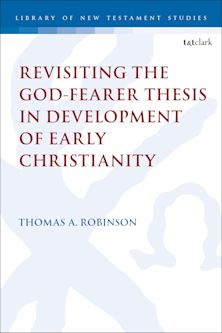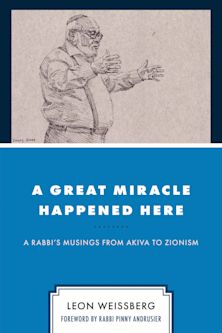- Home
- ACADEMIC
- Religious Studies
- Judaism
- The Making of the Modern Jewish Bible
The Making of the Modern Jewish Bible
How Scholars in Germany, Israel, and America Transformed an Ancient Text
The Making of the Modern Jewish Bible
How Scholars in Germany, Israel, and America Transformed an Ancient Text
This product is usually dispatched within 1 week
- Delivery and returns info
-
Free US delivery on orders $35 or over
You must sign in to add this item to your wishlist. Please sign in or create an account
Description
Tracing its history from Moses Mendelssohn to today, Alan Levenson explores the factors that shaped what is the modern Jewish Bible and its centrality in Jewish life today. The Making of the Modern Jewish Bible explains how Jewish translators, commentators, and scholars made the Bible a keystone of Jewish life in Germany, Israel and America. Levenson argues that German Jews created a religious Bible, Israeli Jews a national Bible, and American Jews an ethnic one. In each site, scholars wrestled with the demands of the non-Jewish environment and their own indigenous traditions, trying to balance fidelity and independence from the commentaries of the rabbinic and medieval world.
Table of Contents
Chapter 1: Spinoza As Jewish Bible Critic
Part I. The Emergence of Modern Jewish Bible Studies in Germany
Introduction: Starting with Germany
Chapter 2: Mendelssohn's Bible: The Ideal of Jewish Self-Sufficiency
Chapter 3: Samson Raphael Hirsch: The Chimera of Self-Explanatory Scripture
Chapter 4: Benno Jacob and the Call for a "Jewish" Bible Scholarship
Chapter 5: The Martin Buber-Franz Rosenzweig Bible: Culture or Religion?
Part II. Zionism and the Creation of a National Bible
Introduction: The Bible in Modern Israel
Chapter 6: Early Zionism and the Bible: Ahad Haam and His Opponents
Chapter 7: The Bible As National Linchpin: David Ben Gurion and His Opponents
Chapter 8: Nehama Leibowitz's Bible: Returning Tradition to the Text
Part III. The Flowering of Jewish Bible Studies in North America
Introduction: America and the Jewish Bible
Chapter 9: Finding A Jewish Voice: Nahum Sarna & Robert Alter
Chapter 10: Seeking An American Jewish Bible
Conclusion: Is There A "Jewish
Product details
| Published | Jul 07 2011 |
|---|---|
| Format | Hardback |
| Edition | 1st |
| Extent | 262 |
| ISBN | 9781442205161 |
| Imprint | Rowman & Littlefield Publishers |
| Dimensions | 9 x 6 inches |
| Publisher | Bloomsbury Publishing |
About the contributors
Reviews
-
Levenson (Univ. of Oklahoma) provides an important work of cultural history, biblical scholarship, and modern Jewish history in his analysis of how Jewish scholars and communities constructed the modern Jewish Bible. He begins his story with Spinoza, whose Jewish sensibilities foreshadowed the development of the Jewish Bible. The real story, however, begins with Mendelssohn in the late 18th century. The Bible became the touchstone for a Jewish German community, in which one could be both fully Jewish and German. In the 20th century, the Jewish Bible became central to the formation and life of the modern state of Israel. It formed the cultural basis for the new nation and the center of its continuing national intellectual and educational life. Finally, in the United States, a fully Jewish biblical scholarship emerged in the 1960s. Within the synagogue, the Jewish Chumash stands as a common source within various Jewish denominations. As a significant cultural achievement, the formation of the modern Jewish Bible is, Levenson argues, "on par with the Jewish Enlightenment, the scientific study of Judaism, the revival of Hebrew, or the Zionist ideology." This volume will be useful in libraries with collections in biblical and Jewish studies. Summing Up: Recommended. Graduate students and above; general readers.
Choice Reviews
-
This book traces how ten Jewish thinkers brought the Bible to the center of Jewish identity over the past four centuries. With a light touch, the author insightfully describes how they and other scholars in Europe, America, and Israel responded to the needs of Western culture and Jewish nationalism.
Andreas Spahn, Florida Atlantic University, Frederick E. Greenspahn, Florida Atlantic University
-
This is an original, creative, and thoughtful guide to a topic and an era (or rather, several topics and several eras) that are crucial to understanding today's Judaism-but they are not usually brought together with the insightful and informative methodology that Levenson has managed to construct. He has a fine eye for both detail and context as he spins out a tale that covers over three centuries and takes place in three continents. Agree with him or disagree with him or come down somewhere in the middle, the engaged reader of this book will be greatly illuminated and moved to think about things, both old and new, in meaningful and fruitful ways.
Leonard Greenspoon, Creighton University
-
Alan Levenson has restored the Bible to its rightfully central place in modern Jewish thought. He has done so with considerable sensitivity and consistent lucidity. This is a book that scholars and laypeople alike will read with profit.
David J. Sorkin, University of Wisconsin, Madison
-
Alan Levenson explains clearly and directly how the meaning of the Bible is socially constructed. He explores how makers of meaning from Spinoza, Jewish Enlightenment thinkers, and modern Jewish thinkers, constructed our ever-changing understanding of the Bible. From his survey of how modern Zionists and Israelis recovered the Bible as a centerpiece of national life, how the challenge of reading the Bible meaningfully has been addressed in an era of doubt, to the celebration of the Bible as an ethnic touchstone in America, he helps explain how the Bible became the connective tissue of Jewish life even as it served as a vehicle for expressing contemporary values. This book is a valuable guide to anyone interested in understanding the Hebrew Bible today.
David Ariel, President of the Oxford Centre for Hebrew and Jewish Studies
-
With refreshing breadth and accessible prose, Alan T. Levenson illuminates the political, social, and religious tensions that shape modern Jewish approaches to the Bible. This wide-ranging and engaging study blends scholarly acumen with a gifted teacher's knack for clarity. Levenson guides the reader to see what is at stake, for some of the most important figures in modern Jewish intellectual history, in how Jews read their sacred text.
Mara Benjamin, St. Olaf College

ONLINE RESOURCES
Bloomsbury Collections
This book is available on Bloomsbury Collections where your library has access.


































